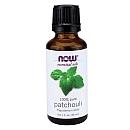Patchouli is a unique essential oil from India, where it is known as puchaput. It was a popular fragrance during the 1800's in Europe, and again during the 1960's in the U.S. It has a very rich aroma that is difficult to classify, and is said to grow more aromatic with the passage of time. This essential oil is 100% pure and 100% natural. Fun fact: In Victorian England, people would buy imported Indian cashmere shawls only if they smelled like patchouli. Its scent proved the shawls had been protected from moths during shipment. Chances are the word "patchouli" brings to mind hippies, free love, and an era of liberation. However, patchouli was used in the East long before the 1970's to scent clothes and linen. In the 19th century, the British learned to identify patchouli as it was used to scent imported fabrics from India. While the musky, earthy scent of patchouli is most associated with fabrics, it has therapeutic properties as well. It's an insect repellent, aphrodisiac, anti-inflammatory, antibacterial, and antifungal. It provides harmony to the body and spirit, and can even fight off body odor by performing as both a deodorant and anti-perspirant. It also has the ability to diminish appetite, making it a friend to dieters all over the globe. Patchouli also has the rare distinction of actually improving with age; the older the oil, the more fuller the scent. Patchouli: it's not just for hippies anymore. Mixes well with: Allspice, Atlas cedarwood, bergamot, cedarwood, cinnamon, clary sage, frankincense, geranium, ginger, grapefruit, lavender, orange, myrrh, palmarosa, pine, rose, rosewood, sandalwood, tangerine, and ylang ylang. Parts used: Non-flower leaves. Extraction method: Steam distillation.


